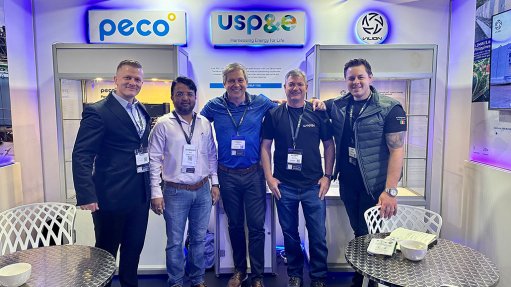
TEAMWORK MAKES THE DREAM WORK USP&E aims to continue making contributions towards establishing more sustainable energy solutions locally
Global engineering, procurement and operation company USP&E is providing various battery energy storage systems (BESSs) for South Africa to address rolling blackouts amid local energy constraints and an increasing need for renewable-energy deployment.
The projects entail deploying advanced battery technologies, coupled with solar and wind power installations, to capture and store excess energy during peak generation periods, and release energy during high-demand periods or when renewable-energy sources are unavailable.
USP&E head of business development Shaun Savage describes the projects as “multifaceted”, noting that BESSs, firstly, facilitate the integration of renewable energy on to the grid by smoothing out intermittent power generation, reducing curtailment and ensuring a consistent power supply.
This, in turn, supports South Africa’s renewable power adoption goals and contributes to a greener energy mix.
“Secondly, these projects significantly ease grid constraints by providing backup power during peak demand, reducing strain on State-owned power utility Eskom, and minimising the occurrence of rolling blackouts,” he adds.
To aid grid reliability and resiliency to ease energy constraints, USP&E is installing a 100 MW battery BESS at a “blue chip” mine – to be commissioned this year – and is installing a 20 MW battery BESS for a private enterprise, to be commissioned in 2024.
The company is also supplying hybrid energy solutions that entail the use of natural gas and renewable energy.
“These projects help us mitigate the cost of energy storage by using stable and reliable baseload power through natural gas generation. We have a large inventory of used, surplus and new generator sets available for quick deployment and generation,” says Savage.
He notes that the company has achieved significant project milestones to date, including successful project initiation and comprehensive design and engineering phases, as well as successfully integrating BESSs with renewable power sources.
“Rigorous testing and optimisation have been conducted to ensure seamless operation and adherence to safety standards. The projects have made remarkable progress, positioning USP&E as a leading player in the energy storage sector,” he enthuses.
The company also sells the containerised EnerCube BESS – a high-safety, integrated energy storage system for user-side energy storage.
The BESS is designed for use in various applications, such as industrial and commercial emergency power, peak-load shifting, system capacity expansion and smoothing new energy power output.
The “all-in-one” design has a maximum capacity of 1 290 kWh, and the batteries come in modules that are stackable, in line with a project’s power requirements.
However, the company has faced various challenges in the midst of project implementation regarding regulatory complexity, funding and investment, as well as technological advancements.
Savage says navigating the regulatory framework and obtaining the necessary permits and approvals can be time-consuming and resource-intensive.
Moreover, USP&E has had to form strategic partnerships and secure financial investments to obtain adequate funding for large-scale energy storage projects.
Staying up to date with the latest technological advancements in BESSs has also proved challenging, whereby selecting the most suitable and efficient solutions has required the company to embark on extensive research and collaboration with industry-leading partners.
Hence, Savage encourages consumers to consider various aspects upon procuring a BESS such as system capacity, scalability, safety and reliability, life-cycle costs and integration capabilities.
Aims
USP&E aims to continue making contributions towards establishing more sustainable energy solutions locally by developing and implementing renewable-energy projects to increase the share of clean energy in the power generation mix.
The company will, therefore, continue to deploy advanced BESSs on a wider scale to promote grid scalability and ensure reliable power supply during peak demand periods.
It also hopes to modernise South Africa’s power grid infrastructure to allow for the seamless integration of renewable-energy sources and enhanced overall grid efficiency and resilience.
The company is committed to creating awareness and increasing educational initiatives on sustainable energy solutions to empower local communities to embrace and benefit from renewable power sources.
By integrating renewable power sources with advanced energy storage systems, USP&E also aims to contribute to renewable power adoption, easing grid constraints and ensuring a reliable and greener energy future.
“USP&E’s dedication to providing sustainable energy solutions, including battery energy storage projects, is instrumental in combating South Africa’s energy challenges.”
With expertise and commitment to innovation, the company continues to empower communities and drive the transition towards a sustainable energy landscape, Savage concludes.